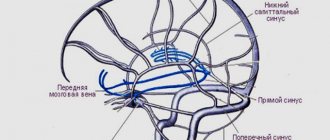With dementia, a person’s main function—cognitive (thinking)—sharply deteriorates. Memory deteriorates, speech is impaired, it becomes difficult not only to work, but also to do simple household chores. The term “dementia” itself is translated from Latin as “feeble-minded.”
Dementia develops more often in older people, but it is wrong to consider its manifestations normal and inevitable. This is an acquired pathological condition that can be prevented, delayed or mitigated with timely measures.
It is important to diagnose dementia as early as possible to prolong your active life and maintain mental clarity. For consultation with a doctor regarding cognitive impairment and diseases of the nervous system, you can contact the Medical Center on Botanicheskaya.
What is dementia and how does it manifest?
Dementia is not a disease in the usual sense of the word. According to the International Classification of Diseases, this is a syndrome, that is, a complex of symptoms associated with a common cause. It is observed in certain brain diseases or develops due to other factors.
One of the first signs of dementia is memory loss. Both long-term and short-term memory weakens: the patient may forget familiar routes and names, ask for the same information over and over again, lose personal belongings, etc. At the same time, the ability to assimilate and process information is impaired.
Additionally, with dementia, at least one group of symptoms from the following list (or several at once) is noted:
- The ability to think logically and solve complex problems is impaired.
- Critical thinking deteriorates. This means that a patient with dementia cannot make decisions and manage money independently; he ceases to see dangers in the environment.
- Speech function is impaired. A person makes mistakes and forgets familiar words, stops understanding phrases in a figurative sense, and pauses when speaking. As the syndrome develops, it becomes increasingly difficult for him to express his thoughts and communicate with loved ones.
- The ability to think in abstract categories is lost.
- The ability to visually recognize objects in space deteriorates. A person has difficulty recognizing people by their faces; he may forget what his house looks like and why the surrounding objects are needed. At the same time, physical vision may remain good - it’s just a matter of cognitive function.
- Human behavior changes and personality disintegrates. The range of interests may narrow, apathy, aggression towards others, sudden mood swings and a desire to avoid social contacts may appear.
Mental activity
Constantly train your brain - a rich and active intellectual life keeps your mental abilities in good shape.
Mental activity, like physical activity, is important for the preservation of cells in the hippocampus, a region of the brain associated with memory. The loss of neurons in the hippocampus slows down as a person constantly learns new things, receives and processes large amounts of information. Several studies have shown that people who engage in more intellectually challenging work show less cognitive decline as they age. In addition, later retirement is associated with a lower risk of developing dementia.
It is assumed that constant intellectual activity creates a certain cognitive “reserve”, allowing the brain to compensate for the negative impact of the disease, leading to the death of neurons, and thereby delaying the onset of its symptoms.
It's never too late to learn something new - choose a direction that interests you and go to language courses, a dance or art studio, or lectures on art or science. Learning foreign languages helps to activate thought processes and memory. Scientists have proven that polyglots suffer from dementia less often, and they develop symptoms of Alzheimer's disease on average 4-5 years later than their peers who know only one language. Dancing classes train your memory while learning movements and complex dance sequences. Scientists have not yet determined which activity has the most beneficial effect on maintaining cognitive functions, so choose the one that brings you pleasure.
Play association games, cities, chess, checkers, backgammon, solve crosswords and sudoku - any logical and intellectual games and activities help establish neural connections in the brain.
Types of dementia and causes of its development
Depending on the causes of dementia, there are several types of this syndrome:
- Dementia due to diseases of the nervous system (also called atrophic). It develops due to damage to brain cells in Parkinson's disease, Alzheimer's disease, Pick's disease and other pathologies. This type also includes dementia with Lewy bodies - pathological formations of a protein nature inside nerve cells.
- Vascular dementia. Its cause can be pathologies of cerebral vessels - from arterial hypertension to stroke.
- Mixed. This type includes dementia that occurs due to a combination of several diseases or risk factors.
Also, the causes of dementia include poisoning with potent drugs and metal salts, metabolic disorders (including diabetes), infectious brain lesions, injuries and tumors, and severe alcohol addiction. These reasons are listed in the medical manual “Dementia” (edited by Academician N.N. Yakhin).
All pathologies and factors have one thing in common: they destroy brain cells. Moreover, the lesion can be focal, because the diseases affect different lobes of the main organ of the nervous system - frontal, temporal, parietal, etc. Depending on the cause and nature of the lesion, the complex of symptoms may also differ when comparing the clinical picture of several patients.
Active social life
An active social life is beneficial at any age, and in the elderly it is necessary both as a remedy for depression and as a stimulator of brain activity.
Scientists suggest that regular social contacts and new acquaintances make people more active in the areas of the brain responsible for language and memory. This causes the brain to form new neural connections that make it more resistant to degeneration.
Traveling, excursions, interest clubs, trips to theaters and exhibitions will bring not only new positive impressions and knowledge, but also new acquaintances and new friends.
Don’t forget about your personal life, including your sex life. The connection between sexual activity and normal brain function is not yet well understood. This gap was partially filled by scientists from Coventry University, UK. They conducted a survey among 6,800 people aged 50 to 89 years from different regions of the country, asking them to answer questions about their sex lives and take a series of tests on memorizing words and recalling number sequences. It turned out that sexually active men were significantly better at both words and numbers. Sexually active women were better at remembering words, but not numbers.
Scientists explain the noticeably better results in sexually active people by the effect on the brain of the hormones dopamine and oxytocin, generated during sexual intercourse and helping to keep the brain in good shape.
Stages of dementia
An important characteristic of dementia: this syndrome does not just involve intellectual impairment. Dementia is diagnosed only in cases where, due to serious impairments, the patient loses the ability to lead a social life, work and take care of himself in everyday life. Until this point, they speak of a gradual decline in mental function, which can last for several years.
It turns out that dementia itself is the most severe degree of cognitive impairment, when it becomes most severe. However, the syndrome also develops in certain stages.
Depending on the severity of the manifestations, there are three stages of dementia:
- Easy. The patient cannot fully work and communicate with other people due to intellectual impairment, his interest in ordinary hobbies and activities weakens. But at the same time, he remains independent in everyday life and navigates his home.
- Moderate. A person loses the ability to use the simplest household items and appliances without the help of loved ones, and constantly needs accompaniment. However, he can still dress himself, lift a spoon to his mouth, or perform other simple tasks.
- Expressed. Such a patient requires almost round-the-clock care, as he is completely maladjusted. At this stage they talk about the so-called “senile dementia”.
In addition, a distinction is made between focal and global dementia. Focal impairments affect a person's memory and intelligence, but his personality and critical thinking are preserved. Global dementia is characterized by a gradual disintegration of personality, serious changes in behavior, and loss of the ability to think critically.
Dementia is a disease of the elderly: how cognitive impairment is associated with age
Dementia is a syndrome that overwhelmingly affects older people. Vascular pathologies, metabolic problems, and diseases of the nervous system often appear in adulthood due to natural causes, and they are the ones that lead to disturbances in mental function.
Moreover, the risk of developing dementia in the elderly increases with age. According to research, among people over 55 years of age, the percentage of cases is up to 8%, while after 80 years of age, the likelihood of experiencing cognitive impairment increases many times (up to 40–45%).
Russian scientists E.E. Vasenina, O.S. Levin and S.G. Sonin calculated that in Russia in 2021 there were 1.7 million people with dementia, and worldwide their number was close to 50 million (based on a scientific article by the named team of authors).
Along with the increase in life expectancy, the number of patients with cognitive impairment will also increase - this is the forecast of scientists. Therefore, early detection of the disease, prevention and supportive care are extremely important.
It's easier to prevent than to cure
Dementia remains a medical condition that currently has no pathogenetic treatment. We cannot influence the cause of the disorder and significantly change the course with the help of the drugs we have. Because of this, it is wise to focus on dementia prevention to reduce the incidence of this disease. An equally reasonable solution would be screening in risk groups, which will identify patients with varying levels of cognitive decline. This approach requires training of professionals and changes in attitudes and alertness towards cognitive impairment. Memory loss and other cognitive impairments are not a feature of old age, but a medical and social problem that requires intervention. Ignoring it is a very short-sighted decision that we cannot afford in the face of a gradually aging global population.
Diagnosis of dementia
Diagnosing dementia can be difficult due to the fact that the range of symptoms and causes that led to cognitive impairment can vary significantly between patients. As a rule, the diagnosis of dementia takes place in several stages and begins with an initial consultation.
To clarify the clinical picture, it is important for the doctor to:
- talk with the patient or person caring for him, collect anamnesis. The doctor uses a questionnaire specially developed for this purpose and finds out when the first signs of dementia appeared and what exactly the cognitive difficulties are. Next, the specialist asks questions about the patient’s lifestyle and health and finds out which risk factors are present;
- assess physical condition - gait, coordination of movements, fluency of speech;
- conduct a short cognitive test using one of the methods accepted in the medical community;
- determine whether dementia is caused by reversible or irreversible causes. This may require laboratory tests.
If the initial conversation and examination is conducted by a therapist, he has reason to suspect the development of dementia, the doctor will refer the patient to a specialized specialist for detailed diagnosis and further treatment.
People often hesitate to see a doctor because they are afraid to hear the diagnosis of dementia and attribute the first signs of the disease to normal age-related changes. But this is a fundamentally wrong tactic, because the earlier the syndrome is identified, the greater the chances of prolonging the usual full life and delaying severe manifestations of the disease.
Is dementia incurable?
Indeed, modern medicine is not yet able to completely reverse the process and cure the onset of dementia. But it is wrong to treat dementia as an irreparable condition in which any treatment is pointless.
It is impossible to do without maintenance therapy, because it can greatly alleviate symptoms, slow down the progression of the disease and improve the quality of life of patients with dementia. In addition, dementia can have a different nature; it is not always caused by incurable neurodegenerative diseases. In some cases, the syndrome is caused by metabolic disorders or infections that can be treated.
In the early stages of dementia, the following factors are important:
For a person with dementia, it is important to create a quiet, homely, familiar atmosphere. Moreover, the circle of people with whom he communicates must be constant. This will eliminate feelings of anxiety, nervousness, confusion and excitement. It’s a good idea to create a daily routine and stick to it strictly.
Lyudmila Zhilevich: “Unfamiliar faces, new situations that a person is no longer able to remember, can provoke an acceleration of the development of the disease, and also negatively affect his condition.”
The first symptoms of dementia are not a reason to give up exercise. This could be walking in your favorite places, simple work in the garden, physical therapy exercises (at least 150 minutes of anaerobic exercise weekly).
Life should be full of various events and types of intellectual activity. You can read, solve crosswords and scanwords, play chess or checkers, discuss past cultural or political events.
It is important for the patient to have a hobby, but it should not only be a source of positive emotions and bring pleasure, but also stimulate cognitive and mental abilities.
A sick person's diet should contain foods that lower cholesterol levels. For example, barley, legumes, blueberries. Instead of butter, it is better to give preference to vegetable oil. The menu can include fermented milk products, lean meats and poultry, lean fish, seafood, and sauerkraut. To improve the taste of dishes, the use of seasonings (sage, cinnamon, turmeric, saffron) is allowed. But it is better to reduce salt consumption to a minimum. You should definitely drink the daily amount of clean water (at the rate of 30 ml per 1 kg of weight). It is better to cook by steaming, you can bake or boil.
If you follow all the doctor’s recommendations, you can slow down the progression of the disease, which means significantly improving the patient’s quality of life and delaying severe manifestations of dementia. At the same time, people who have a hereditary predisposition to developing the disease should pay special attention to prevention: lead a healthy lifestyle, do exercises daily for mental exercise, and control blood cholesterol levels.
An important point is to create comfortable conditions so that a person suffering from dementia remains independent for as long as possible. The best therapy is to spend more time with elderly relatives, surround them with love, care, and help them feel useful and needed, the specialist added.
Drug treatment of dementia and its features
In some cases, the doctor may prescribe specialized medications to slow the progression of the disease and improve the patient's condition. This may be required, for example, in case of infectious brain lesions, pain syndrome, insomnia and in other situations.
Depending on the type of dementia and its clinical manifestations, the doctor may prescribe anti-dementia, vascular-metabolic drugs, as well as antidepressants, sleeping pills or neuroprotectors. If dementia is accompanied by vascular pathologies or metabolic disorders, medications indicated for these conditions may be prescribed.
However, do not forget that uncontrolled use of medications is dangerous. After all, drugs that stimulate improvements in one type of dementia are often contraindicated in cognitive impairment of another nature.
What else is important to know about drug treatment for dementia:
- It is important to take medications prescribed by a specialist regularly, otherwise their effectiveness will be low. It is important for people caring for patients with dementia to understand that an elderly person with cognitive impairment cannot control their medication intake on their own and needs ongoing assistance. In this case, medications should be stored out of reach and given in strict dosages.
- Most medications do not give immediate results. The first improvements can usually be expected within a few weeks after starting therapy.
- Medicines are prescribed for a short period of time (usually up to 3 months), and then it is important to talk with the doctor again and adjust the therapy so that it really effectively resists the development of dementia.
- Be aware of side effects and possible incompatibility of different drugs with each other. So that the doctor can correctly select medications and, if necessary, find replacements for them, it is important to inform the specialist about all medications that a person with dementia is taking.
Non-drug treatment methods
Non-drug methods of maintenance therapy for patients with dementia can also effectively influence the cognitive sphere. They are used simultaneously with taking medications prescribed by the attending physician.
The advantage of these methods is that they have no contraindications and are used for any type of dementia, except for the most severe stage.
What methods of restoring cognitive function are indicated for dementia:
- Cognitive training. During the training, simple fragments of poems are memorized, passages of text are read aloud, and other exercises are performed.
- Cognitive stimulation. It involves influencing different senses, and is often carried out in a group. The activity may include warm-up, simple games, singing, dramatization, riddle solving and other activities.
- Biographical training. Since long-term memory is often affected in dementia, it is helpful to repeat and reconstruct past events.
- Music therapy, art therapy. The interest of patients with dementia in the outside world fades over time, so it is important, at least during special classes, to maintain contact with the field of art, to continue education and development in a simplified form.
- Diary entries. The practice of keeping a diary is not only useful for maintaining speech function, but also allows patients to record their own emotions and experiences.
- Walking and light exercise - physical activity in any form is highly desirable.
It is important to conduct classes daily, devoting enough time to them to get a positive effect.
Prevention of dementia: how to prevent the development of the syndrome
Unfortunately, it is impossible to completely protect yourself from cognitive impairment: they are often provoked by unpredictable and not fully explained by science pathologies (which include, for example, Alzheimer's disease).
However, several areas of dementia prevention are recognized worldwide. They are effective because approximately 35% of dementia is due to modifiable risk factors. By eliminating these factors in advance, you can reduce the risk of cognitive impairment in old age.
What preventive measures are the most effective and important:
- Physical activity. It is physical education that today is considered the basis of prevention, since it has a complex effect on the body and prevents direct and indirect risk factors. It is important to systematically engage in physical activity throughout your life or start as early as possible before cognitive function begins to decline. Intense training brings particular benefits to the brain, but if there are contraindications for it, do it to the best of your ability, appropriate for your age. Physical exercise not only affects the psychological state of a healthy person in the present, but also protects nerve cells and can prevent intellectual decline in the future.
- Maintaining body weight within normal limits. Obesity, and as a result vascular diseases and diabetes, are serious risk factors that are best avoided.
- Treatment of arterial hypertension. If this disease is detected at an early age, it is important not to let it take its course and be registered with a cardiologist. The goal of this area of prevention is to restore the health of the cardiovascular system before disruptions in its functioning provoke irreversible damage to brain cells.
- Mental activity and multi-stage education. To ensure that cognitive functions do not suffer in old age, it is important to give the brain sufficient and constant load. It has been proven that people who only completed primary school and stopped studying at age 11–12 have a one and a half times higher risk of cognitive impairment. At the same time, complete secondary or higher education significantly reduces the likelihood of developing dementia.
- Quitting smoking and drinking alcohol. Destruction of brain cells under the influence of ethyl alcohol or nicotine is one of the indirect causes of dementia, which should be excluded in advance.
- Active social life. Lack of social interaction and voluntary isolation at an early age may also be risk factors. Therefore, it is important to maintain a sufficient number of contacts with colleagues, friends and loved ones.
- A healthy diet, which must include fruits, vegetables and fish, and it is better to reduce the percentage of meat and dairy products. This is the so-called Mediterranean-type diet, which has a beneficial effect on the condition of blood vessels and the body as a whole.
Prevention of dementia: how to meet old age with sound mind and strong memory
Every year, October 1 is celebrated as International Day of Older Persons, and October 10 is World Mental Health Day. According to statistics, 1.9 million people aged 60 years and older live in the Republic of Belarus, which is 19.9% of the population. One of the “side effects” of longevity is dementia or “senile dementia.” About 35 million people worldwide suffer from dementia. Senile dementia is 2-3 times more common in women than in men. According to the World Health Organization, by 2050, almost 100 million people will be at risk of this severe cognitive disorder. Dementia affects such fundamental human abilities as speech, memory, thinking, and the particular danger is that the violation of these abilities occurs gradually and ultimately leads to complete social maladjustment. From 2 to 10 years passes from the appearance of initial signs of dementia to death. A person receives signals about the possibility of the onset of senile dementia at a young age, but they are fully realized in people over 60 years of age. Knowing the signs of this disorder allows you to think in a timely manner about how to avoid dementia and what preventive measures to take.
There are ten such signs:
- memory loss;
- difficulties in doing usual things;
- speech disorder;
- spatial and temporal disorientation;
- persistent suspicions of relatives and friends of theft;
- loss of ability to remember the answer to a question;
- moving objects to unusual places;
- mood swings;
- gradual forgetting of the names of objects;
- depressive state.
At the stage of mild dementia, a person loses the ability to engage in professional activities, and his social activity decreases. The patient loses interest in the world around him. At the same time, he is able to take care of himself and do housework independently.
At the stage of moderate dementia (most often it is colloquially called senile insanity), a person loses self-care skills, including the ability to independently unlock the door lock. A person suffering from moderate dementia cannot be left unattended; he always needs prompting from others, although he continues to monitor hygiene.
The final stage is severe dementia. A person completely loses touch with the environment. He is no longer able to wash himself or eat. Basic self-care skills are forgotten.
The main reasons leading to the development of dementia in old age are:
- neurodegenerative diseases that cause the death of brain cells;
- metabolic disorders;
- cardiovascular diseases;
- traumatic brain injuries;
- infections and brain tumors.
As practice shows, very often people do not think about how to prevent dementia, although the prevention of this disease in young and middle age seems especially necessary. One of the main reasons for ignorance is the stigmatization of senile dementia in society. While cancer, heart disease and even migraines are perceived as likely health conditions that need to be addressed in their early stages, dementia is perceived as something shameful. A person, even having noticed all the signs of impending dementia, tries to hide it, does not want to be a burden. A 2014 sociological survey found that 38% of respondents considered it shameful to tell someone they knew that a relative had dementia. Data from the same survey also indicate that half of the respondents do not even think about old age and all the problems associated with it, including the prevention and treatment of dementia. Taking the necessary measures to prevent the disease in this case becomes almost impossible due to the low awareness of the population about the signs of senile dementia.
Despite the fact that dementia is incurable, it is the prevention of senile dementia that helps to avoid fatal consequences associated with organic brain disorders. And according to experts, you should take care of your mental health from the age of 35-40.
Recently, researchers have drawn attention to the fact that the cause of dementia is often an unhealthy lifestyle. People with low physical activity and those who eat fatty and salty foods are at risk. In addition, a connection has been established between senile dementia and low levels of education. First of all, you need to give up smoking and alcohol in favor of playing sports. A physically active life from a young age will help you avoid dementia in old age. Moderate cardio exercise prevents the risk of cardiovascular disease, which could lead to disruption of the supply of oxygen and nutrients to brain cells. In old age, it is advisable to include walks in the fresh air in your daily routine in any weather. Swimming and race walking are very useful (the pace should be adjusted depending on your health condition). Hard work in the garden, as well as dancing, will not only strengthen the body, but also bring a lot of positive emotions. Prevention of dementia involves moderate but regular physical activity.
One of the most important tips on how to avoid dementia is to follow the rules of a balanced diet. The consequence of excess weight is very often diabetes mellitus or myocardial infarction, which, in turn, cause disturbances in the supply of oxygen and nutrients to the brain. Therefore, a balanced diet is one of the ways to prevent dementia. Prevention of dementia both at 50 and at 30 years old equally consists of eating seafood, a sufficient amount of vegetables and fruits, or following the “Mediterranean diet.” The most familiar foods sometimes play an important role in preventing senile dementia. For example, apples contain significant amounts of quercetin, which protects the brain from neurodegenerative diseases, and the flavonol found in dark chocolate stimulates and improves blood flow to the brain. Green tea, meanwhile, contains catechin, which prevents dementia and supports brain function.
Control of blood sugar, blood pressure and cholesterol is of great importance for the prevention of senile dementia. Arterial hypertension with surges in blood pressure negatively affect the elasticity of blood vessels, and cholesterol plaques deform them. If someone in the family has previously been diagnosed with dementia, blood pressure control is fundamentally important from a young age to prevent this disease.
Mental work will also help to avoid senile dementia: reading books, solving crosswords. And memorizing poems, proverbs and sayings perfectly trains attentiveness and memory. The development of information technology has opened up another great opportunity for mental activity - the study of a computer, with the help of which you can not only receive, but also exchange information, communicate with other people, and remain a socially active person. A great way to prevent dementia is to interact with family and friends. New acquaintances and “personal life” are necessary for older people like air. Therefore, visiting hobby clubs, walks in parks, and communicating on the World Wide Web will fill your life with positive emotions.
But despite all preventive measures, in old age dementia becomes a sad reality for many. The main burden of caring for a person suffering from this disorder falls on the shoulders of relatives. Unfortunately, modern medicine does not have any techniques for teaching patients to regain lost skills. In this regard, we can only talk about providing patients with adequate comfort.
First of all, for this it is necessary to obtain as much information as possible about the nature of dementia. To do this, it is best to consult a specialist. If this is not done, then the situation will become fraught with conflicts precisely because of a lack of understanding that the oddities in the patient’s behavior are due precisely to the loss of cognitive skills, and not to momentary whims. At the same time, there is no need to go to extremes and treat a person like a houseplant or an inanimate object. The emotions of a person suffering from dementia are extremely heightened, therefore, by creating the safest possible environment for him, it is also necessary to create the illusion of his independence. Patience and calm are required from a person caring for a patient, even if it is a hired nurse. Even if a person is affected by senile dementia, prevention is still important. Keeping the patient in good physical shape helps slow down further destruction of cognitive skills. For the same reason, it is necessary to maintain a person’s social activity. Frequent confidential conversations can prevent further loss of the ability to communicate, and organizing everyday life and creating a comfortable home environment for the patient will allow you to maintain self-care skills and independence from others for as long as possible.
Prepared by a psychiatrist from the Ivatsevichi Central District Hospital
Mikhalchik Irina Dmitrievna
Diagnosis and treatment of dementia in Moscow
Senile dementia has a reputation for being incurable, but it is important to remember that some forms are preventable. In addition, even if the affected brain cells cannot be restored, proper treatment can slow down degenerative processes and significantly improve the quality of life of a person experiencing the syndrome. For any type of dementia, the patient must receive the necessary drug and non-drug therapy, as well as full care, help with everyday life and moral support.
You can contact the specialists of the Medical Center on Botanichnaya for detailed advice on the prevention or treatment of dementia. Remember that it’s not the diagnosis that’s scary—it’s the ignorance and lack of qualified help at a time when a lot depends on it.










